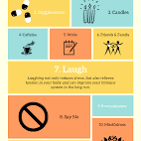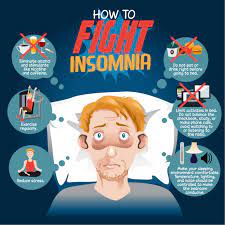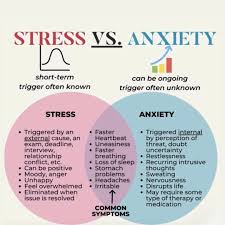Effective Ways to Reduce Stress and Anxiety
Stress and anxiety are common experiences for many people in today’s fast-paced world. While some level of stress is normal, chronic stress and anxiety can have detrimental effects on both our physical and mental health. Fortunately, there are effective strategies that can help reduce stress and anxiety levels.
Practice Mindfulness
Mindfulness involves being fully present in the moment and accepting it without judgment. Mindful practices such as meditation, deep breathing exercises, and yoga can help calm the mind and reduce stress levels.
Exercise Regularly
Physical activity is not only beneficial for our physical health but also plays a crucial role in managing stress and anxiety. Regular exercise releases endorphins, which are natural mood lifters that can help reduce stress levels.
Maintain a Healthy Lifestyle
Eating a balanced diet, getting enough sleep, and avoiding excessive caffeine and alcohol can all contribute to reducing stress and anxiety. A healthy lifestyle supports overall well-being and resilience to stress.
Connect with Others
Social support is essential for managing stress and anxiety. Spending time with friends, family, or joining a support group can provide emotional comfort, practical advice, and a sense of belonging.
Set Boundaries
Learnto say no to tasks or commitments that overwhelm you. Setting boundaries helps prioritize self-care and prevent burnout from excessive responsibilities.
Seek Professional Help
If stress and anxiety persist despite trying self-help strategies, it may be beneficial to seek professional help from a therapist or counselor. They can provide guidance, support, and therapeutic interventions tailored to your needs.
In conclusion, reducing stressand anxiety requires a multi-faceted approach that addresses both physicaland emotional well-being. By incorporating these effective strategies into your daily routine,you can better managestressful situationsand improve your overall quality of life.
Top 9 FAQs on Reducing Stress and Anxiety: Symptoms, Management, and When to Seek Help
- What are the common symptoms of stress and anxiety?
- How does stress impact our physical health?
- What are some effective relaxation techniques for reducing stress?
- Can diet and nutrition influence stress and anxiety levels?
- Is exercise beneficial for managing stress and anxiety?
- What role does sleep play in reducing stress and anxiety?
- Are there natural remedies or supplements that can help alleviate stress and anxiety?
- How can mindfulness practices help reduce stress and anxiety?
- When should someone consider seeking professional help for their stress and anxiety?
What are the common symptoms of stress and anxiety?
Common symptoms of stress and anxiety include persistent feelings of worry or fear, restlessness, irritability, difficulty concentrating, muscle tension, fatigue, and sleep disturbances. Physical symptoms such as headaches, stomach issues, rapid heartbeat, and shortness of breath can also manifest in individuals experiencing high levels of stress and anxiety. It’s important to recognize these signs early on and seek appropriate support and strategies to manage stress and anxiety effectively for overall well-being.
How does stress impact our physical health?
Chronic stress can have a profound impact on our physical health. When we experience stress, our bodies release hormones like cortisol and adrenaline, which trigger the “fight or flight” response. Prolonged activation of this response can lead to increased heart rate, elevated blood pressure, and weakened immune function. Over time, chronic stress can contribute to a range of health issues, including cardiovascular problems, digestive issues, weakened immune system, and even exacerbate existing conditions like diabetes or asthma. It’s essential to recognize the link between stress and physical health to prioritize effective stress management strategies for overall well-being.
What are some effective relaxation techniques for reducing stress?
Effective relaxation techniques play a crucial role in reducing stress and anxiety levels. Some commonly recommended techniques include deep breathing exercises, progressive muscle relaxation, guided imagery, and mindfulness meditation. Deep breathing exercises involve taking slow, deep breaths to calm the mind and body. Progressive muscle relaxation focuses on tensing and then relaxing different muscle groups to release physical tension. Guided imagery uses visualization techniques to create a sense of calm and well-being. Mindfulness meditation encourages focusing on the present moment to promote relaxation and reduce stress. Incorporating these relaxation techniques into your daily routine can help you manage stress more effectively and improve your overall well-being.
Can diet and nutrition influence stress and anxiety levels?
Diet and nutrition play a significant role in influencing stress and anxiety levels. Consuming a well-balanced diet rich in nutrients such as omega-3 fatty acids, complex carbohydrates, and antioxidants can positively impact mood regulation and overall mental well-being. Conversely, a diet high in processed foods, sugar, and caffeine may contribute to increased stress and anxiety levels. Making mindful choices about what we eat can help stabilize blood sugar levels, support brain function, and provide the necessary nutrients for optimal stress management. Therefore, paying attention to our diet and nutrition is essential in addressing stress and anxiety from a holistic perspective.
Is exercise beneficial for managing stress and anxiety?
Exercise is highly beneficial for managing stress and anxiety. Engaging in regular physical activity has been shown to be an effective way to reduce stress levels and alleviate feelings of anxiety. Exercise helps release endorphins, which are natural mood boosters that can improve overall well-being. Additionally, physical activity promotes better sleep, increases energy levels, and provides a healthy outlet for pent-up tension and emotions. Whether it’s going for a brisk walk, practicing yoga, or hitting the gym, incorporating exercise into your routine can be a powerful tool in combating stress and anxiety.
What role does sleep play in reducing stress and anxiety?
Quality sleep plays a crucial role in reducing stress and anxiety. Adequate and restful sleep allows the body and mind to rest, recharge, and recover from daily stressors. During sleep, the brain processes emotions and consolidates memories, which are essential for emotional regulation and stress management. Lack of quality sleep can lead to increased levels of stress hormones, heightened anxiety, irritability, and difficulty coping with challenges. By prioritizing good sleep habits and ensuring sufficient rest each night, individuals can effectively lower their stress levels, improve their mood, and enhance their ability to manage anxiety.
Are there natural remedies or supplements that can help alleviate stress and anxiety?
Many individuals wonder if there are natural remedies or supplements that can help alleviate stress and anxiety. While there are various natural options available, such as herbal supplements like ashwagandha, valerian root, and chamomile, it is essential to approach them with caution and consult with a healthcare professional before incorporating them into your routine. Additionally, lifestyle factors like regular exercise, mindfulness practices, adequate sleep, and a balanced diet can also play a significant role in reducing stress and anxiety levels naturally. It’s important to remember that what works for one person may not work for another, so personalized guidance is key in finding the most effective natural remedies for managing stress and anxiety.
How can mindfulness practices help reduce stress and anxiety?
Mindfulness practices can be highly effective in reducing stress and anxiety by promoting a state of present-moment awareness and acceptance. By focusing on the present moment without judgment, individuals can observe their thoughts and feelings without becoming overwhelmed by them. This heightened awareness allows for a more balanced perspective on stressors, helping to break the cycle of negative thinking and rumination that often accompanies anxiety. Regular mindfulness practice, such as meditation or deep breathing exercises, can help calm the mind, regulate emotions, and cultivate a sense of inner peace, ultimately reducing overall stress levels and promoting mental well-being.
When should someone consider seeking professional help for their stress and anxiety?
When should someone consider seeking professional help for their stress and anxiety? It is important to consider seeking professional help for stress and anxiety when self-help strategies and coping mechanisms are not effectively managing symptoms or when these feelings significantly interfere with daily life, relationships, work, or overall well-being. Persistent and overwhelming feelings of stress and anxiety that impact one’s ability to function normally may indicate the need for professional intervention. A mental health professional can provide assessment, support, and tailored treatment options to help individuals better understand and manage their stress and anxiety in a healthy way.




